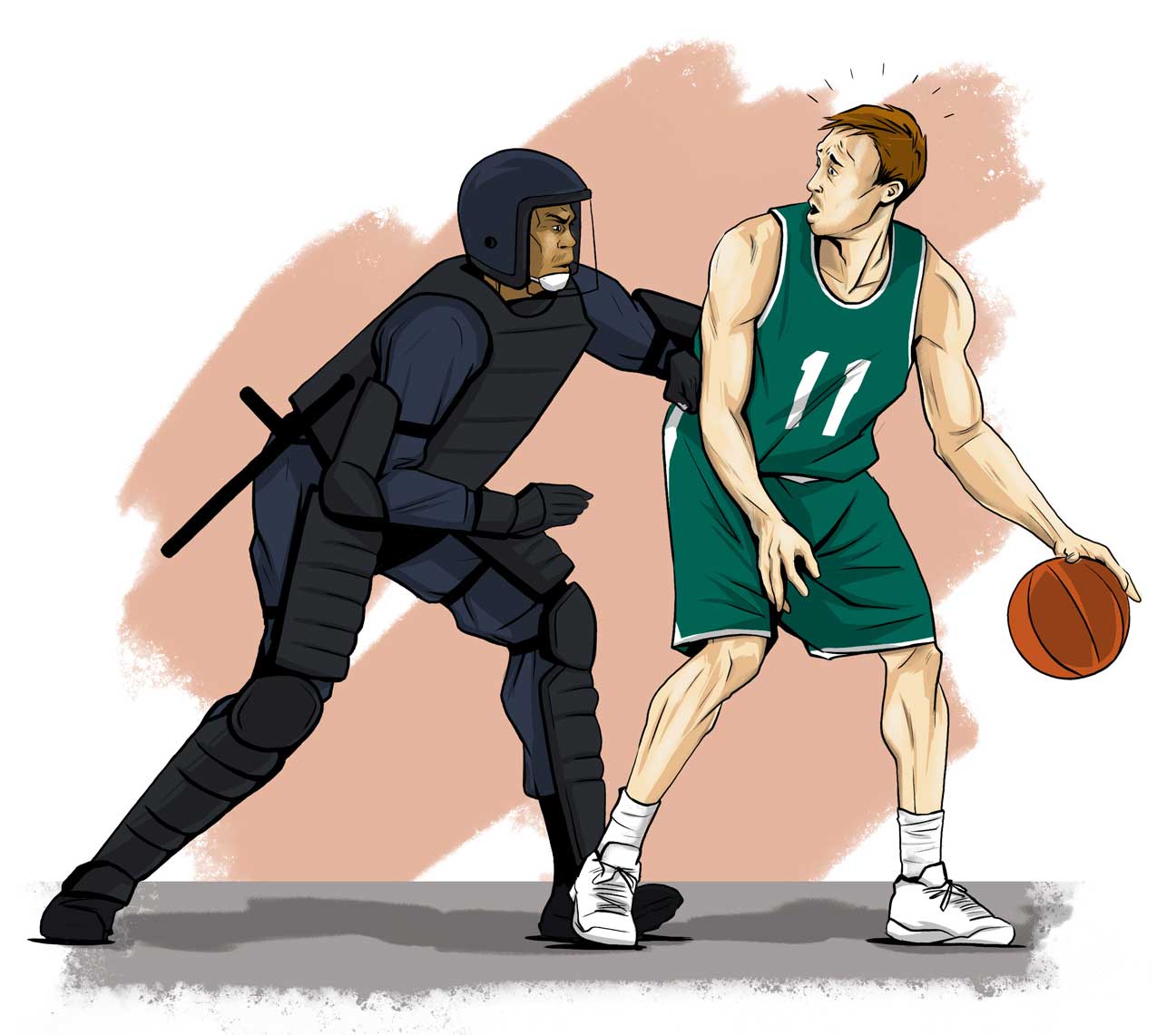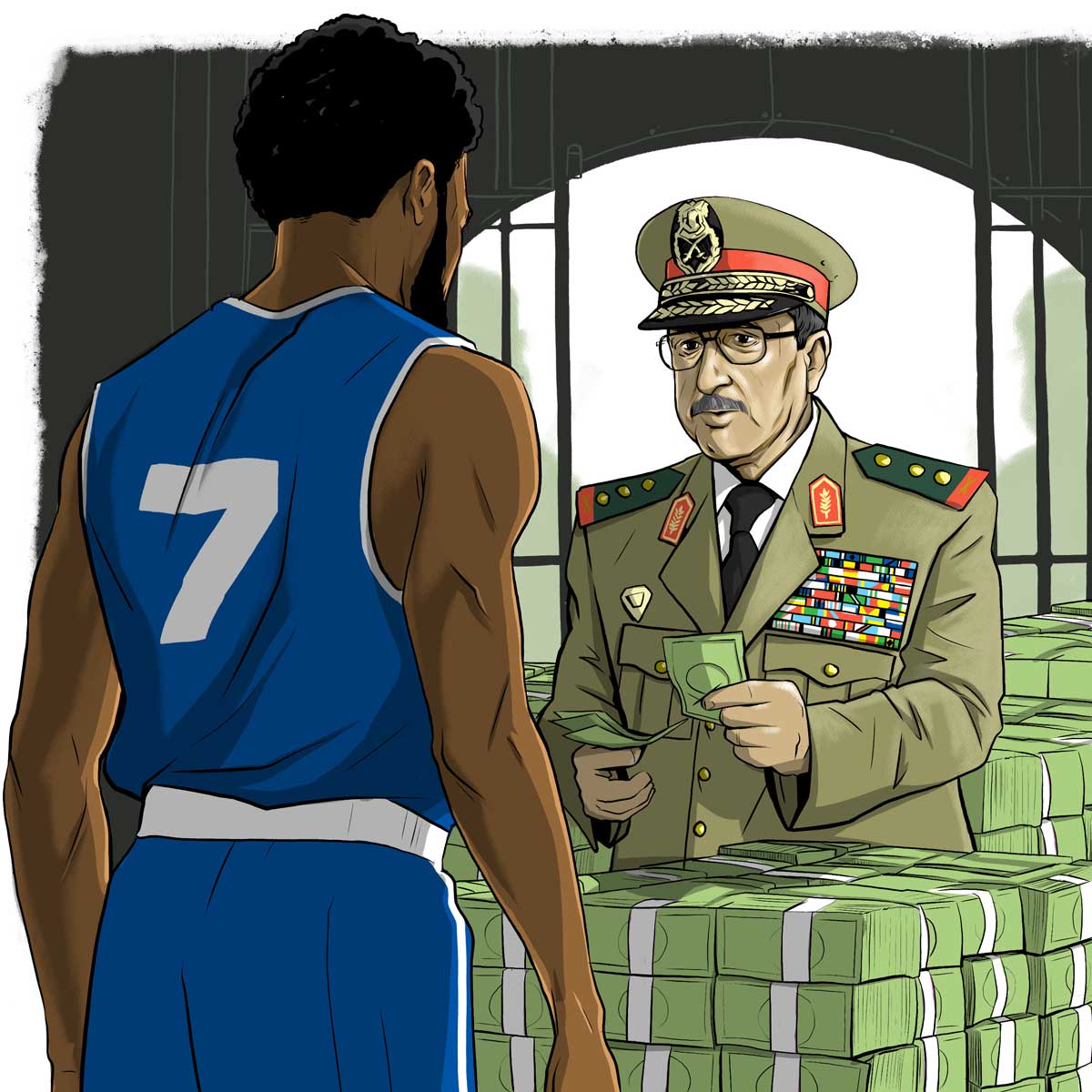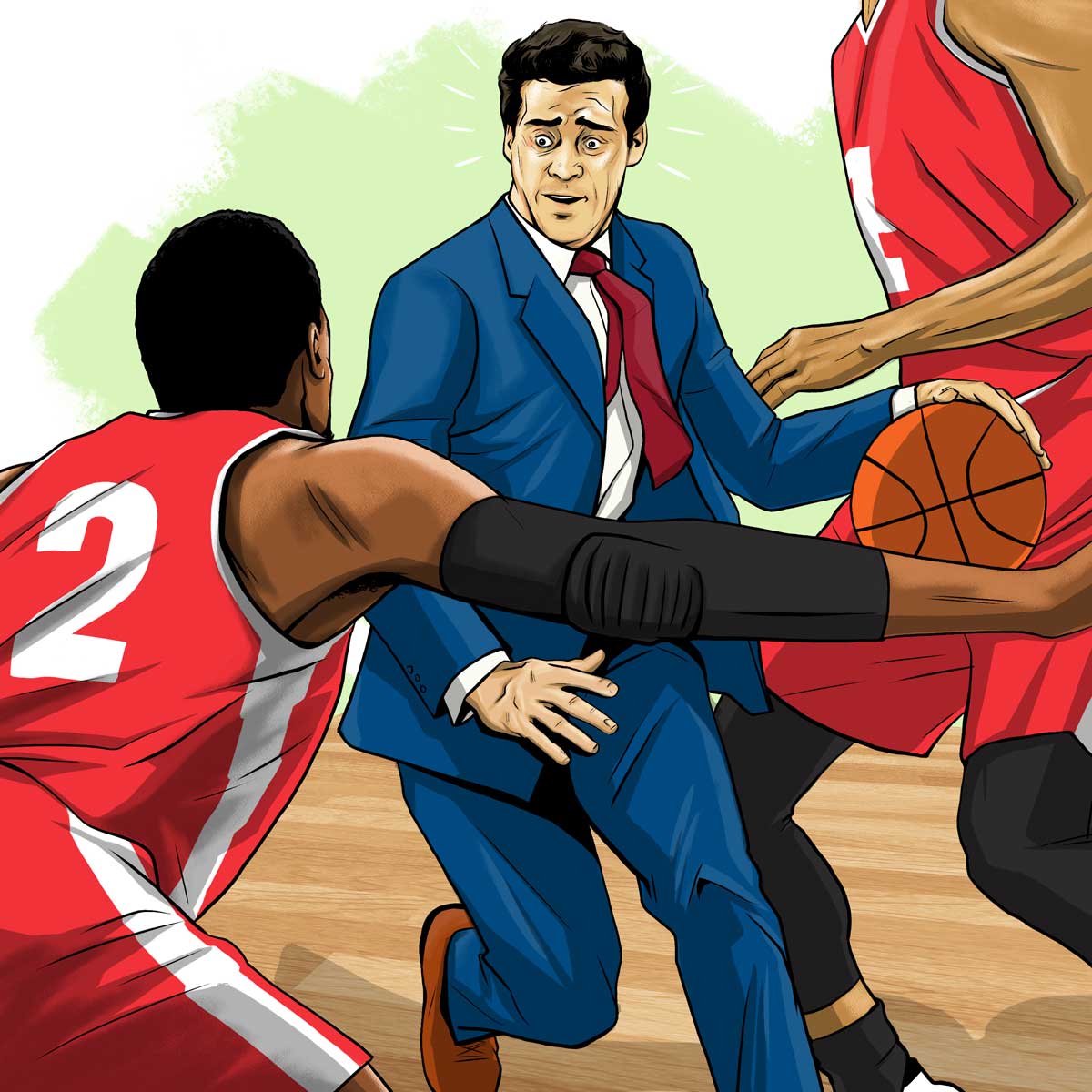There are only 450 roster spots in the NBA, the unquestioned top league in the basketball world.
That means most of the thousands of other aspiring pros must instead chase their dreams overseas, where boredom and financial irregularities are more prevalent than glamour and luxury. While NBA players are driving Bentleys and enjoying bottle service at the club, overseas pros might be sitting in their apartments playing video games and watching movies.
"People think you're playing in Italy and you're partying and going to fashion shows and just enjoying life," said longtime pro Chucky Frierson, who has plied his trade in 16 nations outside his native United States -- Bolivia, Bosnia, Chile, Colombia, the Dominican Republic, Finland, Honduras, Kuwait, Lebanon, Mexico, Montenegro, Norway, Saudi Arabia, Serbia, Sweden and Venezuela. "It's not like that in these countries."
With that in mind, we spoke to players who have competed in every corner of the globe to discuss overseas cultures and salaries and share their most unusual stories from the underbelly of professional basketball. These aren't athletes who merely have played in a few leagues across Europe. These are guys whose passports have more ink than J.R. Smith.
MOST LEAGUES around the world allow only one or two import players per team for competitive reasons. Imports typically earn higher salaries than their domestic counterparts -- but their performances are held to greater scrutiny, and they're often afforded less consideration by referees.
A handful of top players earn seven-figure salaries in Europe and China. Beyond those leagues, there is a severe decline in compensation. Still, there is a good living to be made in international hoops for ambitious, dedicated athletes.
Christien Charles, a 7-foot power forward from Villanova, has played in the Dominican Republic, Lebanon, Saudi Arabia, Serbia, Syria, Thailand and Vietnam. He said his international salaries have ranged from $4,000 per month in Serbia to $13,000 per month in Southeast Asia.
"As a player, it's the most cutthroat situation you'll ever be in. It's like a salesman in the business world. You're trying to sell yourself every single night." Chucky Frierson, on playing in Latin America
Theo Little, a 6-foot-10 center from Arkansas State, has played in Algeria, Brazil, Chile, Germany, Mexico, Indonesia, Japan, Jordan, Kosovo and Saudi Arabia. He worked his way up from $3,000 per month in Brazil to $15,000 per month plus bonuses in Algeria.
Larry Daniels, a 6-foot-7 forward from Eastern Michigan, played in Bahrain, Belgium, Estonia, Kuwait, the Netherlands, Poland and Sweden in the 1990s and 2000s. He said he earned $8,000 to $11,000 per month at the peak of his playing career overseas.
Frierson, a 6-foot-6 swingman who played collegiately at Division II Slippery Rock and Dominican College, said his pay overseas has ranged from $1,180 per month in Finland to around $10,000 monthly in the Middle East.
FANS AROUND THE WORLD can behave much differently than in the United States, and sometimes it can be an eye-opening experience for American players.
Frierson recalls his first game in the Dominican Republic, fresh off a four-hour flight from Atlanta and a two-hour cab ride. He was playing in a steamy gym, and although his team was trailing by 12 in the second quarter, he had eight points and thought he was off to a good start. That's when he heard fans begin chanting, "Send him home!" in broken English, and the calls grew louder and louder as halftime approached. One fan in particular cursed Frierson intensely, and a veteran teammate advised him to take over the game if he didn't want to get right back on a plane.
"I shot the ball every time in the second half and ended up with 32 points," Frierson said. "We won by three. That same fan, at the end of the night, shook my hand and took a picture with me. That's when it sunk in for me that this is what they expect every single night."
In terms of intensity, however, Eastern European fans are in a category of their own. "It's no holds barred over there," said Little, who has no difficulty rattling off incidents of poor fan behavior in Kosovo. He has been hit in the face with a cigarette lighter at the foul line. He has been on a team that was pelted with rocks on its way to the team bus after a game was suspended because of a wet court. He has seen fans hurl flares and pieces of broken chairs, prompting a response from police in riot gear. Once, hundreds of spectators taunted him with a racial slur.

"I played a good game," Little said. "They were probably just mad because I was torching them."
In Algeria, Little played for the CSMC Constantine club in a game at Boufarik, where fans of the home team gave him and his teammates an incendiary welcome.
"People were throwing firecrackers at us during warm-ups," Little said. "They were throwing them at us while we were on the bench. The coach would be trying to draw up a play. BOOM! BOOM!"
By the time a firecracker went off next to him in the fourth quarter, his temper bubbled over. Teammates urged him not to react, but Little couldn't resist raising a middle-finger salute to the crowd. Spectators responded by hurling debris, and police had to escort Little to the locker room for safety.
MOST ATHLETES WHO PLAY overseas long enough have at least one story about not getting paid.
Charles went through it early in his career with the now-defunct KK Novi Sad club in Serbia. He left the team when it stopped paying him during the 2007-08 season but didn't realize the club retained his international rights. As a young player who didn't know how to navigate the FIBA system, it was a major setback.
Although his overseas opportunities were blocked, he was fortunate to land a spot on the Chicago Bulls' summer league team. Playing alongside Joakim Noah and Derrick Rose, Charles didn't get many minutes. But the experience looked great on his résumé and helped him catch on with Lebanese club Champville, which compensated Novi Sad for his rights.
"People were throwing firecrackers at us during warmups. They were throwing them at us while we were on the bench. The coach would be trying to draw up a play. BOOM! BOOM!" Theo Little, describing a game in Algeria
During the 2008-09 season, Little got stiffed by the Piedras Negras Bravos, a now-defunct Mexican team that was based across the border from Eagle Pass, Texas. He was promised $5,500 per month in salary plus $1,500 to get settled. He received about $300 of the relocation money but none of the salary. After a game in Zacatecas, the club couldn't afford to transport the players back home. Eventually, the stranded players made the 500-mile trip by public bus. That was enough for Little, who subsequently accepted an offer to play in the Middle East.
Sometimes, the money disappears before the season even begins.
Charles thought he had a pact secured for the 2012-13 season and showed up for work with the Thailand Slammers of the ASEAN Basketball League. However, the contract an agent had given him turned out to be invalid, and the team already had two imports under contract.
He was invited to stay and practice with the team by head coach Joe "Jellybean" Bryant -- you might have heard of his son, Kobe -- and stuck around while awaiting a job offer. As it turned out, Charles replaced an injured Slammers import and went on to become the league's Defensive Player of the Year. He later won the award again, as well as two Import of the Year honors with Hi-Tech Bangkok City.
In what turned out to be a tragic story, Daniels played for Estonian club TTU A. Le Coq during the 2003-04 season when the paychecks stopped coming. The team's general manager urged players not to worry and kept buying time with pledges to pay. Daniels recalled returning from holiday break and receiving chilling news from teammates.
"The general manager had made all these promises about how much he was going to be able to pay us," Daniels said. "I go to practice the very next day, and everybody is looking depressed and down. They told me the general manager shot himself in the head and died."
The GM, who also served as team president, reportedly had left a suicide note alluding to financial troubles.
IN LATIN AMERICA, the pressure is on for import players to prove themselves immediately. Otherwise, prepare to be exported.
Frierson remembers his brief playing stint in Venezuela. He scored a solid, if unspectacular, 29 total points in his first two games and thought he was performing well. In the third game, he scored 14 points but was rewarded with a plane ticket home.
"As a player, it's the most cutthroat situation you'll ever be in," Frierson said of the Latin American leagues. "It's like a salesman in the business world. You're trying to sell yourself every single night. I've played in countries where I'm going to replace a guy, and I'm sitting in the stands watching him play. After the game, they give him his plane ticket. The next night, I'm playing."
Little said the quality of play is good in South America's top leagues, but he firmly believes the emphasis on scoring requires imports to play selfishly.
"You can be a great rebounder and defender and have a great career in Europe," Little said. "But in South America, you'll be cut the next week. It's all about buckets."
Frierson recalls taking a job in Honduras and playing with teammates who seemed brand new to the sport. He said other players expected the import to carry the team, and the coach instructed him to take almost every shot. In Colombia, he said his experience was like "open gym," because his team ran almost no set plays. Frierson played for the Tijuana Zonkeys in Mexico, where it wasn't unusual for players to cross the border from California for a couple of games to make a quick buck. And just like in South America, said Frierson, "They'll cut you in a heartbeat."
IN TERMS OF CULTURE, few places present more of a stark contrast to home for American players than the Middle East.
Charles played parts of three seasons in Syria just before the nation erupted into civil war, and he said his experience defies many stereotypes. When he sees coverage of the war and the refugees fleeing it, he understands the concern about extremists and terrorism. But he also thinks about the kindness he received from teammates, many of whom have since fled the country.
He joined the Al Jalaa club in Aleppo for the postseason Syrian Cup tournament in 2009. Al Jalaa defeated Army-affiliated Al Jaish for the title, and the losing team signed him the following season. Al Jaish, based in Damascus, won the 2010 league championship and finished second in 2011 with Charles on the squad. While playing for Al Jaish, he lived at an Army sports complex. On payday, he would go to a military base, where a Syrian general would go into a safe to retrieve his salary.

Toward the end of his time in Syria, Charles was awakened in his hotel by protesters loudly marching in the street, and he recalls a teammate advising him not to discuss the government in public.
"That was one of the most meaningful places I have played," Charles said. "Damascus was like a family city to me. You would see families out together. My teammates were very warm, and they took care of me if I needed something. ... After we won the championship, I met a Syrian family that invited me over for dinner. I have a lot of good memories from playing in Syria."
Little turned down offers to play in Bahrain and Syria early in his career, but in 2009, he accepted a deal in Saudi Arabia, where Muslim law and customs are followed strictly. Games are sometimes halted for prayer. There is no alcohol, and there are few distractions.
Little played for Saudi club Al Safa in 2009 and averaged 25 points and 15 rebounds per game on a struggling team hoping to avoid relegation. He said the facilities were good and players were treated well, but he didn't get much help from his fellow starters on the court.
"I figured it would be a good place for me to just work on my skills and train," Little said. "That's exactly what it was, and I was making some good money. ... But I could pick four high school kids that could help me win more than those guys."
WHEN DEALING WITH a language barrier, some things inevitably get lost in translation.
Daniels and Seattle-based agent Adam Prossin remember a misunderstanding that fortunately was cleared up before things turned ugly. In 2010, they organized a training camp for young pros and junior players in Strumica, Macedonia. For the better part of a week, local youths followed players around and peppered them with calls of "slika" -- which to American ears sounded similar to a particular racial slur.
"The players didn't really know what they were saying," Prossin said. "After four or five days of this, the players are coming up and asking, 'Are they saying what we think they're saying?'"
Said Daniels, who has coached at various levels since retiring as a player in 2008: "We were walking and almost got into a fight. We're talking about a team of big basketball players ready to jump on a group of Macedonian kids because they don't know the language."
Daniels and Prossin are able to laugh about it now. A hotel staffer informed them that slika means photograph in Macedonian, and the youngsters wanted to take pictures with the athletes. After that, the players happily obliged slika requests for the starstruck locals.
A COUPLE OF YEARS removed from his experience in Lebanon, Frierson signed with club KK Strsljen Gusinje in Montenegro for the 2015-16 season. Unbeknownst to him, one of the team owners fancied himself as the starting point guard.
"This guy can't get the ball past half court," Frierson said. "He was making substitutions on the floor. He was left-handed and never went right and shot 3s from everywhere. But he's the owner, so what can you say?"

Frierson, who typically played the wing positions but can also run the point, offered to bring the ball upcourt, clear out and spot up the owner for 3-point looks. But the boss wasn't hearing any of it. To hear Frierson tell it, the coach instructed him and the team's other American guard to handle the ball -- and as the owner got less and less of the spotlight, the Americans got less and less money. When the Americans returned from a winter road trip to an apartment with no electricity, no heat and no Internet, they tapped out.
Frierson signed with a Bolivian team, and the other American caught on with a team in Kosovo. Strsljen Gusinje had posted a 3-6 record with the Americans in the lineup and went 0-15 without them.
CHARLES, 35, IS AT AN AGE when many players start considering life after basketball, but he said he has no plans to stop playing professionally.
"I love meeting different kinds of people and learning about different cultures," said Charles, who is playing for the Saigon Heat in the ASEAN this season. "It has made me more open-minded. I want to squeeze out a couple more years. I have some injuries that linger, but I want to play as long as I can."
Little, 32, is coaching and working as a personal trainer while he rests an injured knee at home in Memphis. He plans to head overseas again once he's healthy and gets the right offer.
Frierson, 34, retired earlier this year. He is working as a physical education teacher at an Atlanta elementary school and is pursuing a master's degree from Jacksonville State.
"A lot of it had to do with the uncertainty," Frierson said of his decision to retire. "Every year for 11 years, living out of a suitcase and coming back and forth. I just want to come home and be normal for once."
